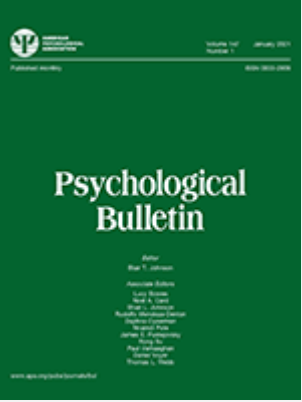干预对儿童和青少年社会情感和认知技能影响的消退和持续性:随机对照试验荟萃分析综述。
IF 19.8
1区 心理学
Q1 PSYCHOLOGY
引用次数: 0
摘要
研究人员和政策制定者希望教育干预措施能够改变儿童的长期发展轨迹。然而,干预措施对认知和成绩的影响通常会随着时间的推移而逐渐消失。关于社会情感技能的持续性,虽然理论上有很多说法,但人们知之甚少。目前的荟萃分析调查了干预对社会情感技能的影响是否比对认知技能的影响更持久。我们从八项已有的荟萃分析中选取了一些研究,得出了 86 项针对婴儿期至青春期儿童的教育随机对照试验样本,共涉及 56662 名参与者和 450 个在后测和至少一次随访中测量的结果。我们采用元回归方法对持续率进行建模,并测试了测试后的影响幅度对后续影响幅度的预测程度。我们发现,在 6 至 12 个月的随访中,测试后的影响对认知技能和社会情感技能的随访影响具有同等的预测作用,这表明不同技能类型的条件持续率相似。在 1 至 2 年的跟踪中,持续率较低,而且认知技能的条件持续率要高于社会情感技能。平均而言,观察到的小幅积极后续影响超出了测试后影响的直接预测,这表明干预措施可能会产生并非完全由测试后影响所中介的长期影响。这种结果模式意味着,较小的测验后影响比较大的测验后影响产生更持久的效果,社会情感技能的影响平均小于认知技能的影响。从整体上看,干预对社会情感和认知技能的影响都会逐渐消失,特别是对那些产生较大初始影响的干预。本文讨论了相关理论和未来发展方向。(PsycInfo Database Record (c) 2024 APA, 版权所有)。本文章由计算机程序翻译,如有差异,请以英文原文为准。
Fadeout and persistence of intervention impacts on social-emotional and cognitive skills in children and adolescents: A meta-analytic review of randomized controlled trials.
Researchers and policymakers aspire for educational interventions to change children's long-run developmental trajectories. However, intervention impacts on cognitive and achievement measures commonly fade over time. Less is known, although much is theorized, about social-emotional skill persistence. The current meta-analysis investigated whether intervention impacts on social-emotional skills demonstrated greater persistence than impacts on cognitive skills. We drew studies from eight preexisting meta-analyses, generating a sample of 86 educational randomized controlled trials targeting children from infancy through adolescence, together involving 56,662 participants and 450 outcomes measured at posttest and at least one follow-up. Relying on a metaregression approach for modeling persistence rates, we tested the extent to which posttest impact magnitudes predicted follow-up impact magnitudes. We found that posttest impacts were equally predictive of follow-up impacts for cognitive and social-emotional skills at 6- to 12-month follow-up, indicating similar conditional persistence rates across skill types. At 1- to 2-year follow-up, rates were lower, and, if anything, cognitive skills showed greater conditional persistence than social-emotional skills. A small positive follow-up effect was observed, on average, beyond what was directly predicted by the posttest impact, indicating that interventions may have long-term effects that are not fully mediated by posttest effects. This pattern of results implied that smaller posttest impacts produced more persistent effects than larger posttest impacts, and social-emotional skill impacts were smaller, on average, than cognitive skill impacts. Considered as a whole, intervention impacts on both social-emotional and cognitive skills demonstrated fadeout, especially for interventions that produced larger initial effects. Implications for theory and future directions are discussed. (PsycInfo Database Record (c) 2024 APA, all rights reserved).
求助全文
通过发布文献求助,成功后即可免费获取论文全文。
去求助
来源期刊

Psychological bulletin
医学-心理学
CiteScore
33.60
自引率
0.90%
发文量
21
期刊介绍:
Psychological Bulletin publishes syntheses of research in scientific psychology. Research syntheses seek to summarize past research by drawing overall conclusions from many separate investigations that address related or identical hypotheses.
A research synthesis typically presents the authors' assessments:
-of the state of knowledge concerning the relations of interest;
-of critical assessments of the strengths and weaknesses in past research;
-of important issues that research has left unresolved, thereby directing future research so it can yield a maximum amount of new information.
 求助内容:
求助内容: 应助结果提醒方式:
应助结果提醒方式:


